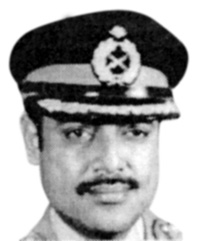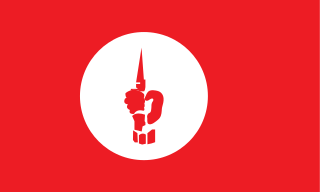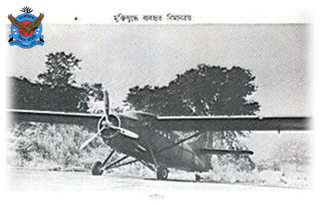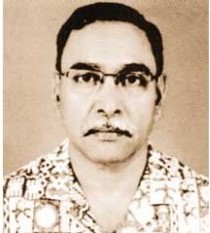
Barishal Division is one of the eight administrative divisions of Bangladesh. Located in the south-central part of the country, it has an area of 13,644.85 km2 (5,268.31 sq mi), and a population of 8,325,666 at the 2011 Census. It is the least populous Division within the entirety of Bangladesh. It is bounded by Dhaka Division on the north, the Bay of Bengal on the south, Chittagong Division on the east and Khulna Division on the west. The administrative capital, Barisal city, lies in the Padma River delta on an offshoot of the Arial Khan River. Barisal division is criss-crossed by numerous rivers that earned it the nickname Dhan-Nodi-Khal, Ei tin-e Borishal.

Bir Bikrom is the third highest gallantry award in Bangladesh. Like the other gallantry awards, this was introduced immediately after the Bangladeshi Liberation War. Bir Bikrom was awarded to 175 fighters.

Muhammad Ataul Goni Osmani, also known as Bangabir, was a Bengali military leader. Osmani's career spanned five decades, beginning with service in the British Indian Army in 1939. He fought in the Burma Campaign during World War II. After the partition of India in 1947, he joined the Pakistan Army and served in the East Bengal Regiment, retiring as a colonel in 1967. Osmani joined the Provisional Government of Bangladesh in 1971 as the commander-in-chief of the nascent Bangladesh Forces. Regarded as the founder of the Bangladesh Armed Forces, Osmani retired as a four-star general from the Bangladesh Army in 1972.

Khaled Mosharraf, Bir Uttom was a Bangladeshi military officer known for his role in the Bangladesh Liberation War. Khaled was the Sector Commander of Bangladesh Forces Sector 2, leader of the Crack Platoon and K Force (Bangladesh) Brigade Commander during the Bangladesh War of Independence. He fought heroically for Bangladesh's independence and was wounded in front line combat against the Pakistan Army. Under his command K-Force played a crucial role in the unconditional surrender of the Pakistani Army on 16 December 1971. On 23 October, while commanding an operation of the K-Force, Khaled Mosharraf was gravely wounded by enemy fire and required a long period of recovery. Although he suffered a bullet injury, he recovered and remained in command of Bangladesh Forces Sector 2. He is best known as an exceptional combatant who had planned and carried out guerrilla warfare from deep within the jungles of Melaghar. More than thirty five thousand guerilla fighters fought under Khaled's command in sector 2.

The Operation Jackpot was a codename for three operations undertaken by Bengali Mukti Bahini in former East Pakistan against the Federation of Pakistan during the climax of the Bangladesh Liberation War.
Shafaat Jamil, Bir Bikrom was a Bangladesh Army colonel. He was the commanding officer of the 3rd East Bengal Regiment of Z Force Brigade in Sector 11 of Bangladesh Forces during the War of Bangladesh Independence in 1971. He was among the first Bengali officers who rebelled against the Pakistani Army in the 1971 Liberation War of Bangladesh and later fought in 11 sector and in Sylhet sector.
Kazi Mohammed Shafiullah Bir Uttam, also known as K. M. Shafiullah, is a retired Bangladeshi general, former Chief of Army Staff of the Bangladesh Army, and former Member of Parliament.
Melaghar Camp was a training camp for Bengali guerilla fighters during Liberation war of Bangladesh. In a cabinet meeting of Bangladesh government, held on July 11, 1971, the Bangladeshi forces were divided into eleven sectors. Melaghar, near Agartala, India, was the headquarters of sector two.

The Mukti Bahini, also known as the Bangladesh Forces, was the guerrilla resistance movement consisting of the Bangladeshi military, paramilitary and civilians during the War of Liberation that transformed East Pakistan into Bangladesh in 1971. They were initially called the Mukti Fauj.
The Crack Platoon was a special commando team of the Mukti Bahini which was formed in 1971 during the Bangladesh Liberation War. It was formed by young members of Mukti Bahini which carried out commando operations in Dhaka and its surroundings and led by Major Khaled Mosharraf. The commandos were mostly students and civilians, received guerrilla training later in the training camps for Mukti Bahini and then engaged in battle against Pakistan Army.
Mirza Aftabul Qader was a Bangladesh Army officer who was killed in the Bangladesh Liberation war. He was posthumously awarded Bir Uttam by the government of Bangladesh.

Kilo Flight is the code name for the Mukti Bahini combat aviation formation during the Bangladesh Liberation War in 1971. It consisted of one DHC-3 Otter plane and one Alouette III helicopter, both carrying rocket pods and machine guns for launching hit-and-run attacks on Pakistani targets, and one DC-3 Dakota for logistical missions. 9 Bengali pilots and 58 ex PAF personnel formed the unit under the command of Group Captain A. K. Khandker in September 1971. The aircraft were supplied by Indian Authorities and the formation was led by Squadron Leader Sultan Mahmud under the operational control of IAF base Jorhat. The unit started training in October 1971 at Dimapur in Nagaland, and this unit was the first to launch airstrikes on Pakistani targets in East Pakistan on December 4, 1971, by attacking oil depots at Narayanganj and Chittagong. In total the unit flew 90 sorties and 40 combat missions between December 4 and 16, 1971. After the war, it formed the core of the nascent Bangladesh Air Force.
Khondkar Nazmul Huda was a veteran of the Bangladesh Liberation war. The Bangladesh government awarded him the title of Bir Bikrom for his bravery in the war of independence.
Badrul Alam is former Squadron Leader of Bangladesh Air Force and heroic freedom fighter of the Bangladesh War of Independence. For his bravery in the war of independence, the government of Bangladesh awarded him Bir Uttam award, the second highest award for individual gallantry in Bangladesh. In 2016, he received the Independence Day Award.
Shamsul Alam was a veteran of Bangladesh Liberation war. For his bravery during Operation Kilo Flight the Government of Bangladesh awarded him the title of Bir Uttom. He was awarded the Independence Day Award in 2017.
Abdus Salek Choudhury was a veteran of Bangladesh Liberation war. For his bravery in the war of independence, the government of Bangladesh awarded him the title of Bir Uttom. He held the rank of Captain during the war. He served as Commander of Sector-2.

Liaquat Ali Khan is a freedom fighter of the Bangladesh Liberation War. The Bangladesh government awarded him the title of Bir Uttom for his bravery in the independence war.
Ejaz Ahmed Chowdhury is a retired Major General of Bangladesh Army and a heroic freedom fighter of the Liberation War. He served as the Director General of Bangladesh Rifles from 12 February 1995 to 18 July 1996.
Kheora is a village in the east-central part of Bangladesh. It is located at Mehari Union under Kasba Upazila in Brahmanbaria district of Chittagong division. Administratively, the village is divided into Ward No. 7 and 8 of Mehari Union. The village is known as the birthplace of Hindu spiritual saint Anandamayi Ma.
Shaheed Bir Uttam Lt Anwar Girls' College is an educational institution in Dhaka Cantonment, Dhaka, Bangladesh. This is one of the most prestigious institutions imparting education to girls. It is managed by Bangladesh Army and primarily for the children of Army personnel. But students from the civilian section also can study in this college.







